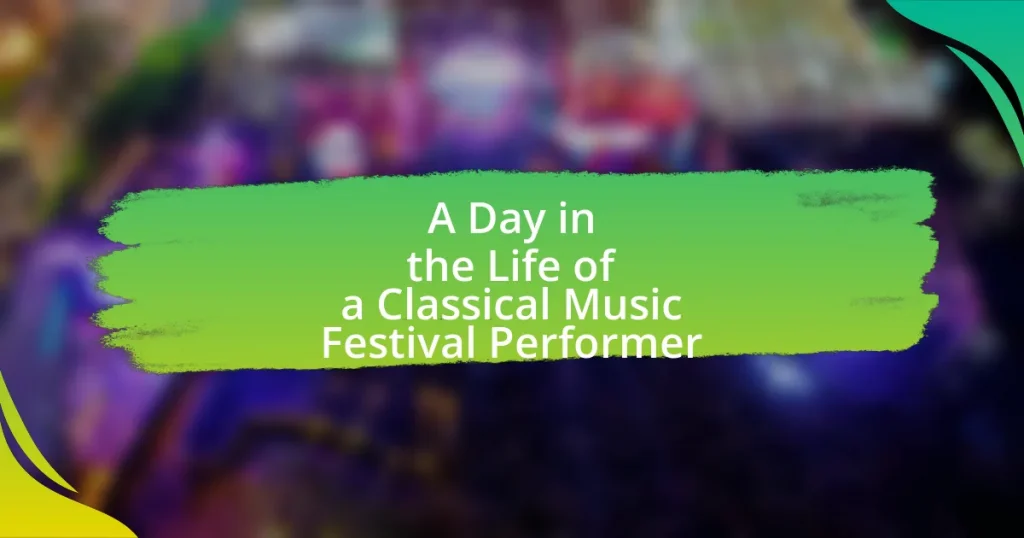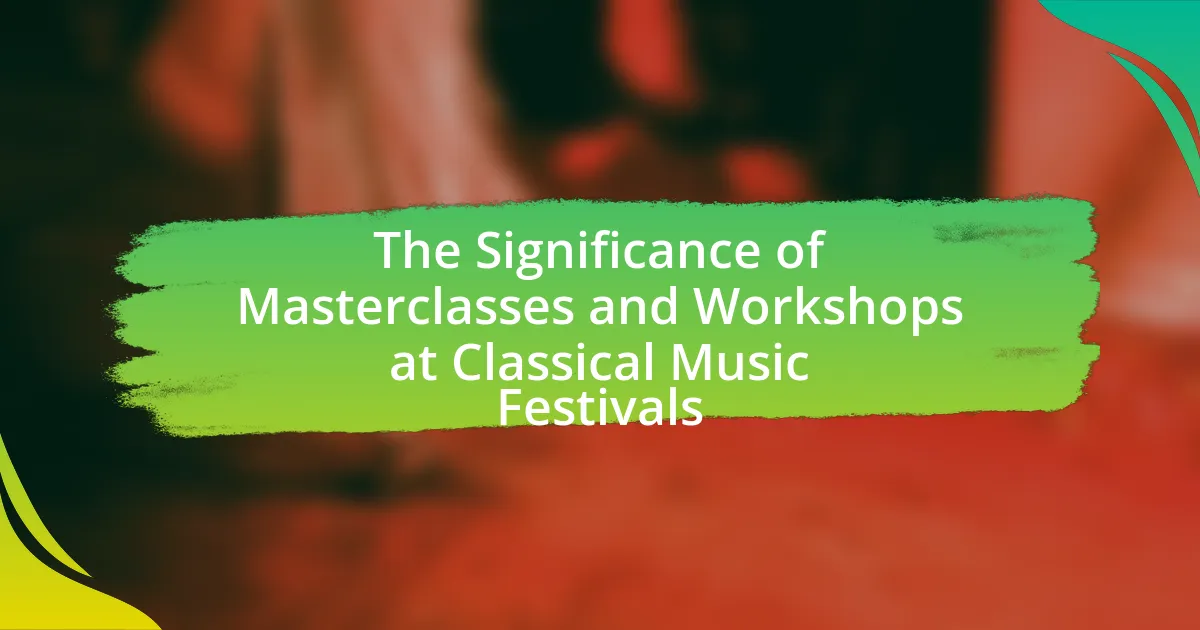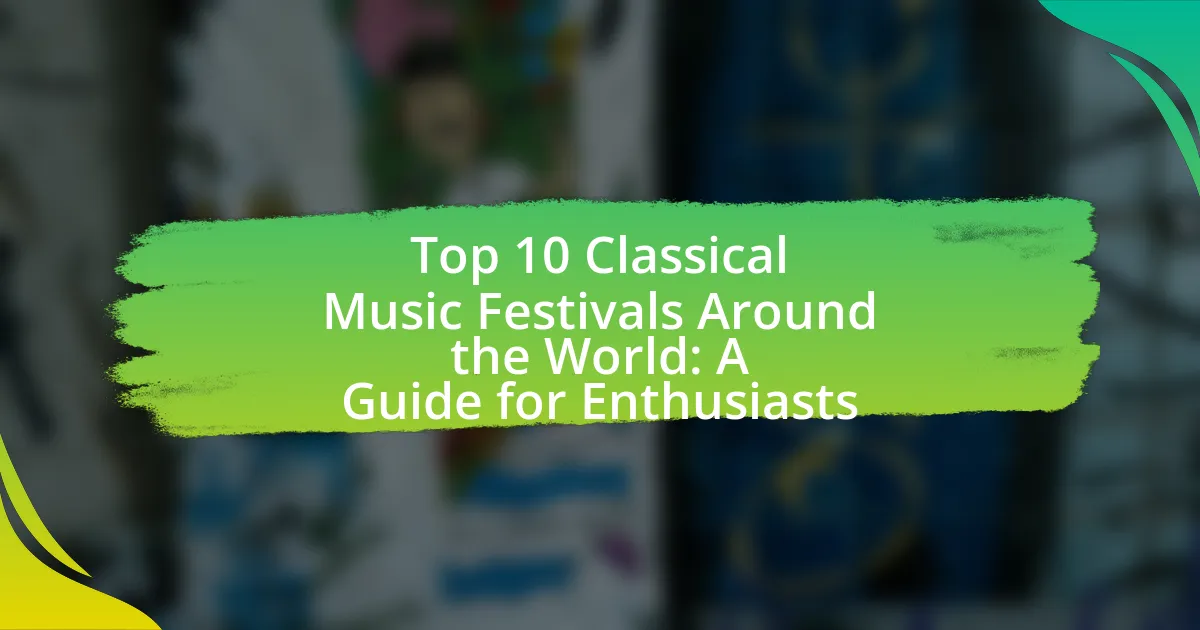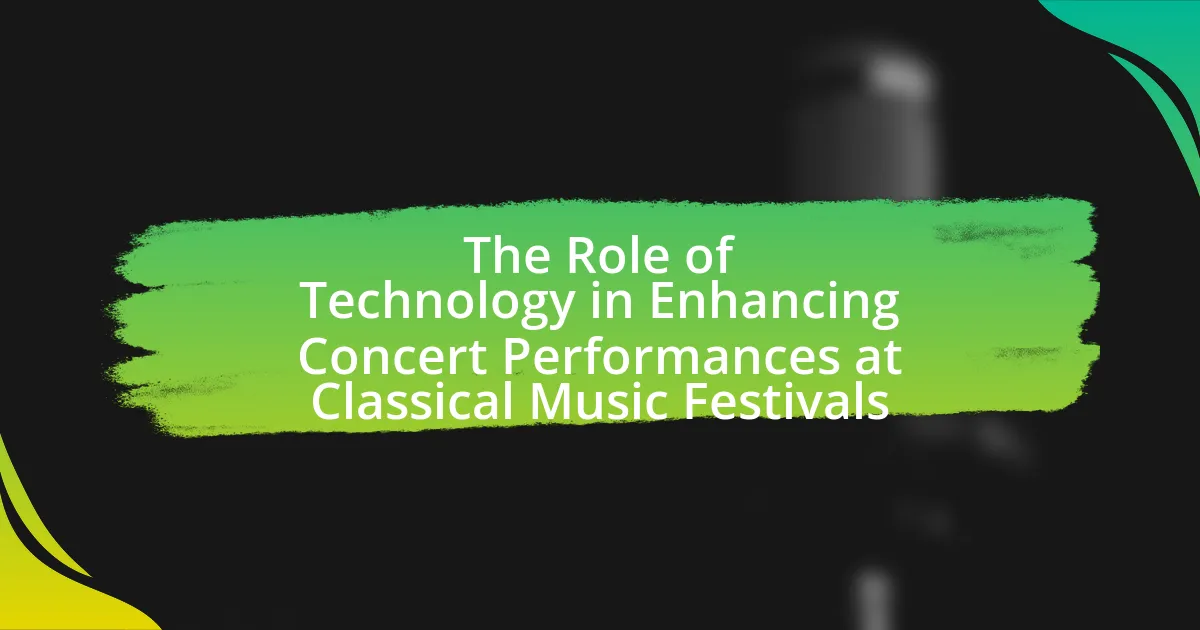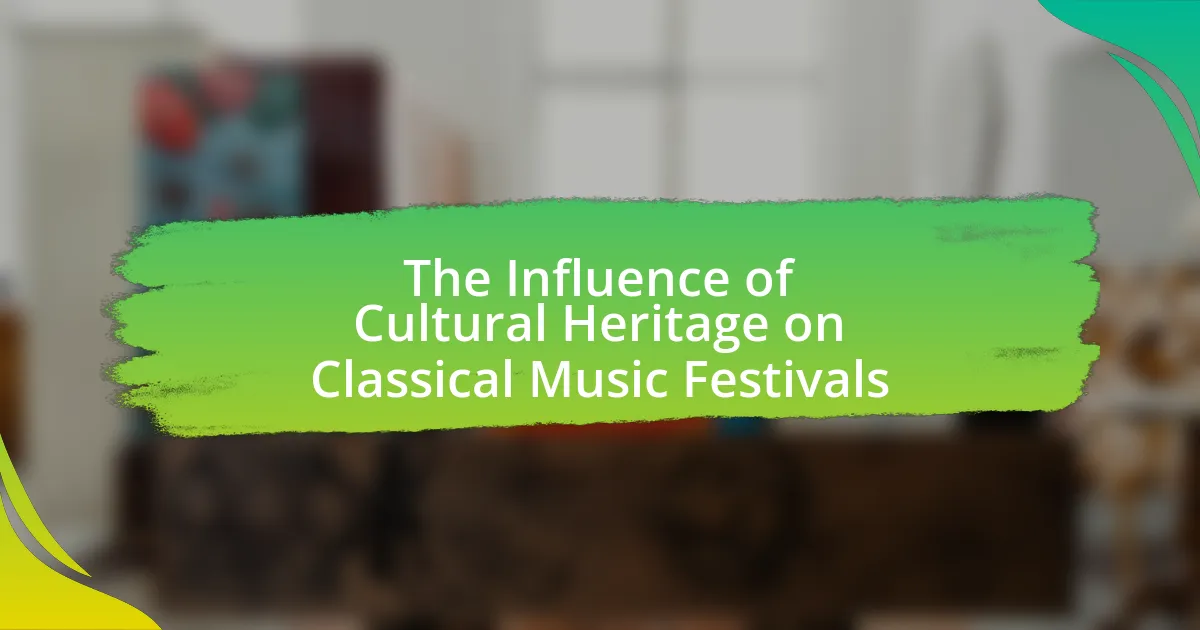A classical music festival performer engages in a structured daily routine that includes warm-up exercises, individual practice, group rehearsals, and scheduled performances. Preparation for the festival involves extensive practice, repertoire selection, and logistical arrangements, while performers face challenges such as competition, performance anxiety, and logistical issues during the event. Networking plays a crucial role in their experience, fostering professional relationships and collaboration opportunities. Performers reflect on their growth and emotional responses throughout the festival, highlighting the impact of these experiences on their careers and artistic development. Strategies for effective time management and coping with stress are also essential for enhancing their festival experience.
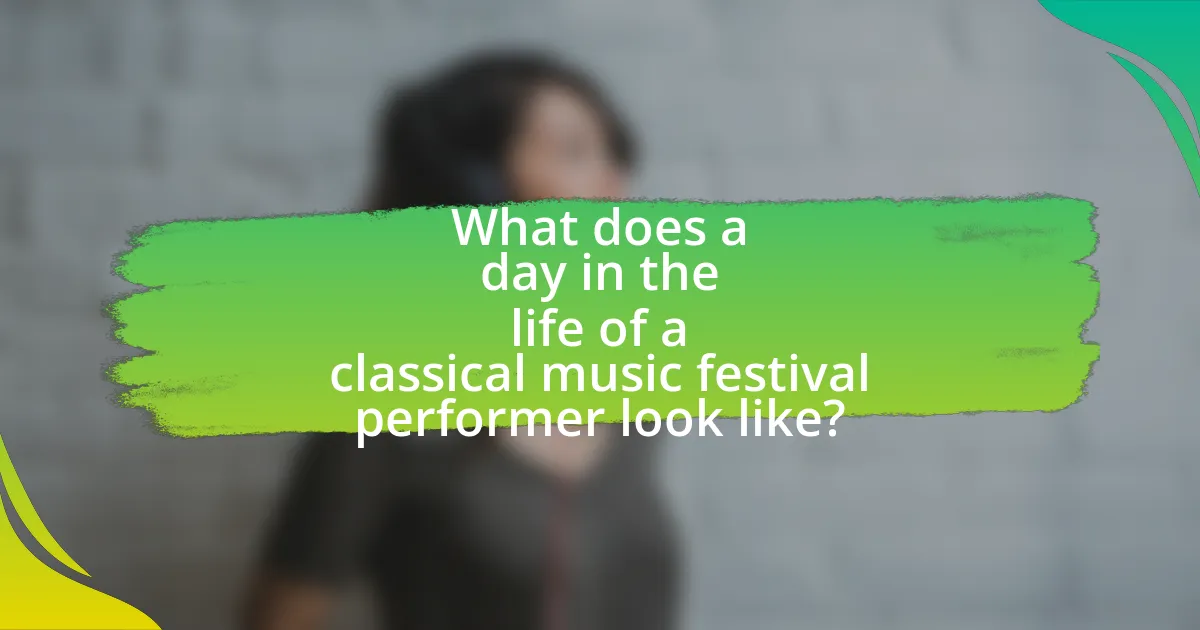
What does a day in the life of a classical music festival performer look like?
A day in the life of a classical music festival performer typically involves rehearsals, performances, and networking activities. Performers usually start their day with warm-up exercises and individual practice sessions to prepare for the day’s events. Following this, they participate in group rehearsals where they collaborate with other musicians to refine their pieces, often under the guidance of a conductor or music director.
As the day progresses, performers may have scheduled performances, which can range from solo recitals to full orchestral concerts. These performances are often held in various venues, requiring performers to adapt to different acoustics and settings. After the performances, networking with fellow musicians, composers, and audience members is common, as building professional relationships is crucial in the classical music community.
This structured routine is essential for maintaining high performance standards and fostering collaboration, which are vital components of a successful classical music festival experience.
How do performers prepare for a classical music festival?
Performers prepare for a classical music festival by engaging in extensive practice, selecting repertoire, and coordinating logistics. They typically dedicate several weeks or months to rehearsing their pieces to ensure technical proficiency and artistic expression. This preparation often includes individual practice sessions, group rehearsals with fellow musicians, and consultations with conductors or coaches to refine interpretations. Additionally, performers must arrange travel, accommodations, and instrument transportation, ensuring all logistical aspects are managed well in advance of the festival. This comprehensive preparation is essential for delivering high-quality performances that meet the expectations of both the audience and festival organizers.
What are the essential practices leading up to the festival?
Essential practices leading up to the festival include rigorous rehearsals, collaboration with fellow musicians, and preparation of repertoire. Musicians typically engage in daily practice sessions to refine their individual skills and ensure they are performance-ready. Collaborative rehearsals are crucial for synchronizing with other performers, allowing for the development of ensemble cohesion and interpretation of the music. Additionally, selecting and preparing the repertoire involves careful consideration of the festival’s theme and audience, ensuring that the chosen pieces resonate with the event’s objectives. These practices are foundational for delivering a polished and engaging performance at the festival.
How do performers manage their schedules during the festival?
Performers manage their schedules during the festival by utilizing detailed planning and communication strategies. They often rely on a centralized schedule that outlines performance times, rehearsals, and other commitments, which helps them allocate their time effectively. Additionally, performers frequently coordinate with festival organizers and fellow musicians to ensure that they are aware of any changes or updates to the schedule. This collaborative approach is essential, as it allows them to balance their individual practice sessions with group rehearsals and performances, ensuring a cohesive presentation.
What challenges do performers face during the festival?
Performers face several challenges during the festival, including intense competition, logistical issues, and performance anxiety. Intense competition arises from the presence of numerous talented artists, making it difficult for individual performers to stand out. Logistical issues can include inadequate rehearsal time, unpredictable weather conditions, and technical difficulties with sound equipment, which can disrupt performances. Performance anxiety is common among artists, as the pressure to deliver a flawless show in front of an audience can lead to stress and self-doubt. These challenges can significantly impact the overall experience and performance quality of classical music festival performers.
How do performers handle performance anxiety?
Performers handle performance anxiety through various techniques such as deep breathing, visualization, and preparation. Deep breathing helps to calm the nervous system, allowing performers to focus better. Visualization involves imagining a successful performance, which can boost confidence and reduce anxiety. Additionally, thorough preparation and practice can instill a sense of control and readiness, further alleviating anxiety. Research indicates that these methods are effective; for instance, a study published in the Journal of Music Therapy found that musicians who practiced relaxation techniques reported lower levels of performance anxiety.
What logistical issues might arise during the festival?
Logistical issues that might arise during the festival include inadequate transportation arrangements, insufficient accommodation for performers, and challenges in coordinating schedules. Inadequate transportation can lead to delays in artist arrivals, impacting rehearsal times and performance schedules. Insufficient accommodation may result in performers being unable to rest adequately, affecting their performance quality. Additionally, challenges in coordinating schedules can create conflicts between rehearsals, performances, and other festival events, leading to a disorganized experience for both performers and attendees. These issues are common in large-scale events, as highlighted by studies on event management that emphasize the importance of thorough logistical planning to ensure smooth operations.
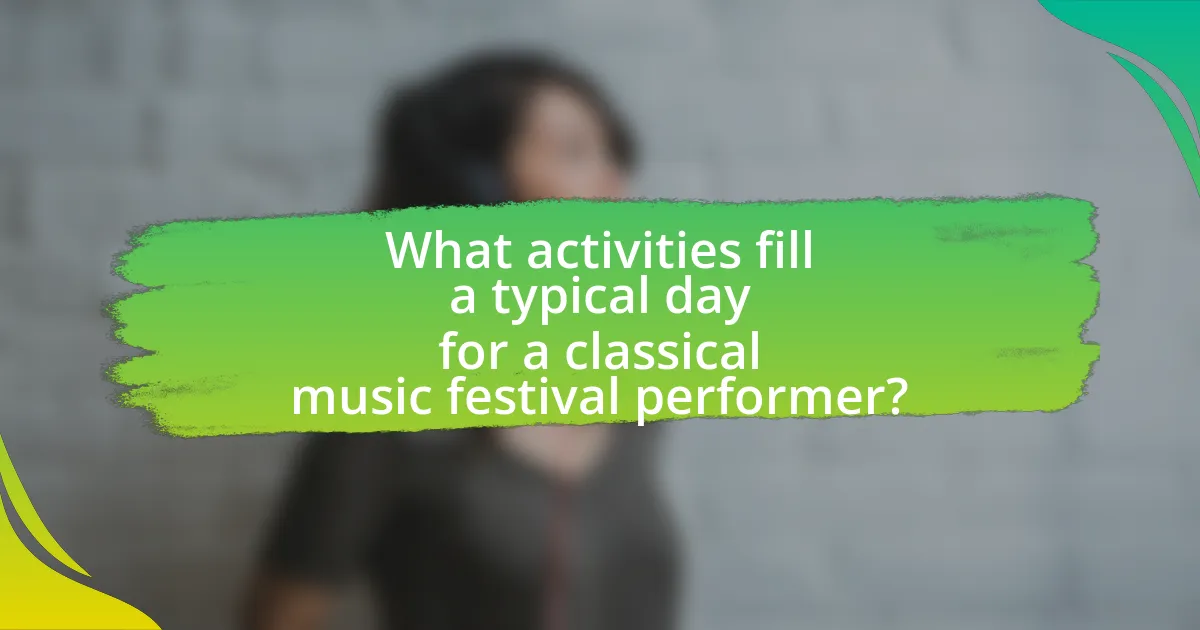
What activities fill a typical day for a classical music festival performer?
A typical day for a classical music festival performer includes rehearsals, performances, and networking activities. Performers usually start their day with individual practice sessions to refine their skills and prepare for the day’s events. Following this, they participate in group rehearsals, where they collaborate with other musicians to fine-tune their pieces, often under the guidance of a conductor.
In the afternoon, performers may have additional rehearsals or attend workshops that focus on various aspects of performance and interpretation. As the evening approaches, they prepare for their scheduled performances, which may include solo recitals or ensemble concerts. After the performances, networking with fellow musicians, composers, and audience members is common, fostering professional relationships and collaboration opportunities.
This structured schedule is essential for maintaining high performance standards and ensuring a successful festival experience.
How do performers balance rehearsals and performances?
Performers balance rehearsals and performances by meticulously scheduling their time and prioritizing tasks. They often allocate specific hours for rehearsals, ensuring they have ample practice before each performance, while also considering the need for rest and recovery. For instance, a classical musician may rehearse for several hours a day leading up to a concert, but will also incorporate breaks and lighter practice sessions to maintain peak performance levels. This structured approach allows them to refine their skills while being prepared for the demands of live performances, which can be physically and mentally taxing.
What is the typical rehearsal schedule like?
A typical rehearsal schedule for a classical music festival performer involves daily sessions that can range from three to six hours, often divided into multiple blocks throughout the day. These rehearsals usually include individual practice, ensemble work, and sectionals, allowing performers to refine their skills and collaborate effectively. For instance, a common structure might include a morning session for solo practice, followed by an afternoon ensemble rehearsal, and concluding with evening sectionals. This schedule is designed to maximize preparation for performances, ensuring that musicians are well-coordinated and confident in their pieces.
How do performers prepare for their specific performances?
Performers prepare for their specific performances through a combination of practice, mental preparation, and logistical planning. They typically engage in extensive rehearsals to refine their technique and interpretative choices, often dedicating several hours daily to practice their pieces. Mental preparation involves visualization techniques and relaxation exercises to enhance focus and reduce performance anxiety. Logistically, performers ensure they have the necessary equipment, such as instruments and sheet music, and they familiarize themselves with the performance venue to optimize their stage presence. This structured approach is essential for delivering a successful performance, as evidenced by studies showing that consistent practice and mental conditioning significantly improve performance outcomes in musicians.
What role does networking play in a performer’s day?
Networking plays a crucial role in a performer’s day by facilitating connections that can lead to performance opportunities, collaborations, and career advancement. Performers often engage with fellow artists, industry professionals, and audiences to build relationships that enhance their visibility and reputation. For instance, studies show that 70% of jobs are found through networking, highlighting its importance in the performing arts where personal connections can directly influence booking decisions and collaborative projects. Additionally, networking allows performers to exchange knowledge and resources, further enriching their artistic development and career trajectory.
How do performers connect with other musicians and industry professionals?
Performers connect with other musicians and industry professionals primarily through networking at events, collaborations, and social media platforms. Networking at events such as classical music festivals allows performers to meet peers and industry insiders, fostering relationships that can lead to future collaborations. Collaborations on projects or performances also create opportunities for performers to establish connections with other musicians and industry professionals. Additionally, social media platforms like Instagram and LinkedIn enable performers to showcase their work, engage with others in the industry, and build a professional network. These methods are supported by the fact that many successful musicians cite networking as a key factor in their career advancement, highlighting the importance of these connections in the music industry.
What opportunities for collaboration arise during the festival?
During the festival, opportunities for collaboration arise primarily through ensemble performances, workshops, and networking events. Ensemble performances allow musicians to collaborate with peers, creating unique interpretations of classical pieces. Workshops provide a platform for performers to learn from each other and share techniques, fostering a collaborative learning environment. Networking events facilitate connections among artists, composers, and industry professionals, leading to potential future collaborations on projects or performances. These collaborative opportunities enhance the overall experience for performers and contribute to the festival’s vibrant atmosphere.
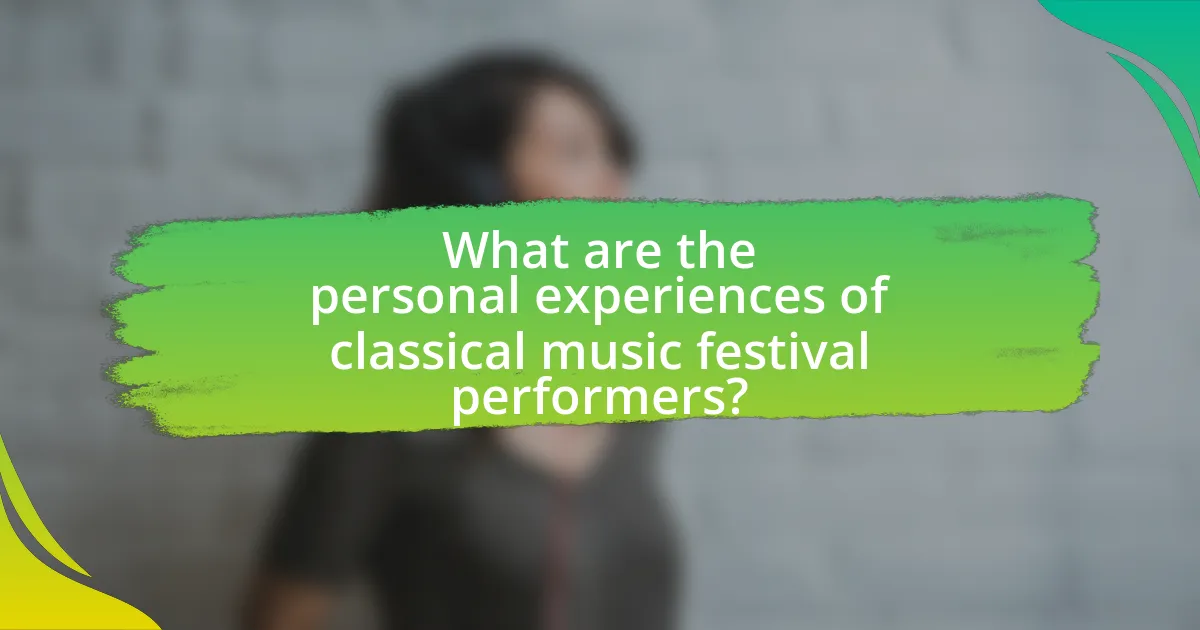
What are the personal experiences of classical music festival performers?
Classical music festival performers often describe their experiences as a blend of intense preparation, emotional fulfillment, and community engagement. They typically undergo rigorous practice schedules leading up to the festival, which can span several weeks or months, ensuring they are performance-ready. During the festival, performers experience a unique atmosphere filled with collaboration, as they work alongside fellow musicians, conductors, and composers, fostering a sense of camaraderie.
Additionally, many performers report feelings of exhilaration and nervousness before taking the stage, as live performances can evoke strong emotional responses from both the musicians and the audience. The opportunity to share their artistry in front of a live audience is often cited as a highlight, providing a sense of accomplishment and connection.
Moreover, performers frequently engage in networking opportunities, which can lead to future collaborations and career advancements. This combination of preparation, performance, and community interaction contributes to a rich and rewarding experience for classical music festival performers.
How do performers feel about their performances?
Performers often feel a mix of emotions about their performances, including excitement, anxiety, and satisfaction. This emotional spectrum is influenced by factors such as audience reception, personal expectations, and the overall experience of the performance. Research indicates that performers frequently experience pre-performance anxiety, which can lead to heightened focus and energy during the actual performance, ultimately contributing to a sense of accomplishment when they successfully engage the audience. Additionally, studies show that positive feedback from audiences can significantly enhance performers’ feelings of fulfillment and joy regarding their performances.
What emotions do performers experience before and after a show?
Performers experience a range of emotions before and after a show, including anxiety, excitement, and relief. Before a performance, anxiety often arises due to the pressure to deliver a flawless presentation, while excitement stems from the anticipation of sharing their art with an audience. After the show, performers typically feel relief and satisfaction, especially if the performance went well, as evidenced by audience reactions and personal fulfillment. Studies indicate that these emotional responses are common among performers, highlighting the psychological complexities of live performance.
How do performers reflect on their growth during the festival?
Performers reflect on their growth during the festival through self-assessment and feedback from peers and mentors. They often evaluate their technical skills, stage presence, and emotional expression after each performance, noting areas of improvement and strengths. This reflective practice is supported by structured feedback sessions, where experienced musicians provide insights based on their observations, helping performers identify specific aspects to enhance. Additionally, many performers keep journals to document their experiences and progress, allowing them to track their development over the course of the festival. This combination of self-reflection, peer feedback, and documentation creates a comprehensive framework for assessing growth in a festival setting.
What insights can performers share about their festival experiences?
Performers can share insights about their festival experiences, highlighting the importance of collaboration and audience engagement. Many musicians report that festivals provide unique opportunities to connect with fellow artists, fostering a sense of community and shared creativity. For instance, performers often mention that the collaborative atmosphere enhances their artistic expression, as they can experiment with new ideas and receive immediate feedback from peers. Additionally, engaging with diverse audiences allows performers to gauge the emotional impact of their music, which can inform their future performances. This interaction is crucial, as studies show that audience feedback significantly influences a performer’s artistic development and confidence.
What lessons do performers learn from participating in festivals?
Performers learn valuable lessons in collaboration, adaptability, and audience engagement from participating in festivals. Collaboration is essential as performers work closely with other musicians, fostering teamwork and communication skills. Adaptability is crucial due to varying performance conditions and diverse audiences, which helps performers become more versatile. Audience engagement teaches performers how to connect emotionally with listeners, enhancing their stage presence and performance quality. These lessons are reinforced by the dynamic environment of festivals, where performers face real-time challenges and opportunities for growth.
How do performers view the impact of festivals on their careers?
Performers view the impact of festivals on their careers as significantly beneficial. Festivals provide exposure to larger audiences, networking opportunities with industry professionals, and the chance to collaborate with other artists, which can lead to future engagements. For instance, a survey conducted by the National Endowment for the Arts found that 70% of musicians reported that participating in festivals helped them gain visibility and credibility in the music industry. This visibility often translates into increased performance opportunities and potential record deals, reinforcing the importance of festivals in advancing their careers.
What tips can enhance the experience of a classical music festival performer?
To enhance the experience of a classical music festival performer, it is essential to prioritize preparation and self-care. Performers should practice extensively before the festival to ensure confidence and familiarity with the repertoire, as studies show that thorough preparation can significantly reduce performance anxiety. Additionally, maintaining physical and mental well-being through proper nutrition, hydration, and rest is crucial, as fatigue can negatively impact performance quality. Engaging with fellow musicians and networking can also enrich the experience, fostering a sense of community and collaboration, which is often highlighted in successful festival environments.
How can performers effectively manage their time during the festival?
Performers can effectively manage their time during the festival by creating a detailed schedule that prioritizes rehearsals, performances, and rest periods. This structured approach allows performers to allocate specific time slots for each activity, ensuring they meet all commitments without feeling overwhelmed. Research indicates that time management techniques, such as the Pomodoro Technique, can enhance focus and productivity, which is crucial in a festival setting where multiple events occur simultaneously. By adhering to a well-planned timetable, performers can balance their artistic responsibilities with personal well-being, ultimately leading to a more successful festival experience.
What strategies can help performers cope with stress and fatigue?
Performers can cope with stress and fatigue by implementing strategies such as regular physical exercise, mindfulness practices, and structured rest periods. Regular physical exercise, such as yoga or aerobic activities, has been shown to reduce stress hormones and improve overall well-being, which is crucial for performers facing demanding schedules. Mindfulness practices, including meditation and deep-breathing exercises, help performers manage anxiety and enhance focus, leading to improved performance quality. Additionally, structured rest periods allow performers to recover physically and mentally, preventing burnout and maintaining peak performance levels. Research indicates that these strategies can significantly enhance resilience and performance sustainability in high-pressure environments like classical music festivals.
